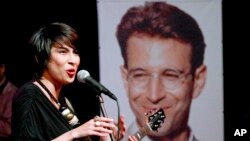When a Pakistani celebrity singer used the hashtag #MeToo last month to accuse a male colleague of sexual harassment, it shook the country's entertainment industry.
"Sharing this because I believe that by speaking out about my own experience of sexual harassment, I will break the culture of silence that permeates through our society," Meesha Shafi wrote on her Twitter feed.
Shafi was not the first woman in Pakistan to use the hashtag or share her story. The #MeToo movement that started in the United States about 10 years ago and gathered steam after powerful women in Hollywood picked it up in 2017, had touched Pakistan already, but mostly on social media and primarily with women sharing their experiences without naming names.
But Shafi was definitely one of the most famous ones. Many wondered if the public controversy would lead to a wider debate on sexual harassment and appropriate behavior between sexes. But it also unleashed a backlash so strong that Shafi had to deactivate her Facebook and Instagram accounts.
"The abuse, threats, bullying and slander that I have faced is the reason I felt the strong need to protect not just myself but my family, especially my two young children who were also being subjected to personal attacks online," Shafi told Dawn, an English language newspaper.
In Pakistan, a conservative Muslim society, women are expected to dress modestly, keep their distance from men, and avoid public places frequented by men. Many public restaurants offer separate areas for families.
Despite these measures, many women complain of constant harassment.
"Inappropriately touching a woman, brushing against her, pinching her butt in a crowd, is considered a norm," said Frieha Altaf, an event manager and a social activist who recalls facing rampant sexual harassment growing up.
Women who speak up against sexual harassment, especially in the workplace, face accusations of having an agenda.
"I don't think harassment is an issue anywhere. Women are lying when they say they are getting harassed," said Tufail Akhtar, a veteran journalist who has reported on Pakistan's film industry since the 1960s. He also added that working women often use sex as a tool to get ahead in their careers. In the case of Shafi, for example, it must be a business dispute, or professional jealousy, he said.
His sentiments were not unique. In the social media storm that followed Shafi's declaration, many accused her of seeking cheap publicity by aligning herself with the global Me Too movement and questioned her timing.
"You should have slapped him at the spot, now don't cry at spilt milk ... cheap publicity, nothing more than that," tweeted someone who described himself as Invincible Aamir with the handle @m_mflyinghorse.
Such accusations, as well as a fear of economic consequences, keep most women from bringing their stories to light, say women's rights activists.
"I personally feel that women are scared of coming forward because in the private sector they are usually scared of losing their jobs. That's the biggest fear," said Kashmala Tariq, the newly appointed Federal Ombudsperson for Protection against Harassment of Women at the Workplaces.
Tanzeela Mazhar, a journalist and a female anchor who was working for Pakistan's public television station PTV, was a victim of such backlash.
She accused her boss of sexual harassment and said she has been paying the price for years in the form of financial and emotional trauma.
She has been out of a job since last year when she resigned in protest, along with another female colleague. Her harasser has since been fired but she hasn't found another job.
"I think people have attached a stigma to me and labelled me as a trouble maker. They know I will raise hell any time I see sexual harassment not just with me but with others around me," she said.
Meanwhile, her harasser has filed two lawsuits against her that are still ongoing, including a criminal charge. "I am out on bail," she said.
Tariq acknowledges the law does not provide adequate protection for victims who raise their voices.
"There are quite a few lacunas in our laws. We have proposed amendments and sent them to the law ministry. A member of Senate has also tabled them…. It doesn't just pertain to women, it pertains to men and transgenders also," she said.
On the flip side, she said, she had seen cases in which women tried to misuse the harassment law to get around administrative issues, like unwanted transfers.
A few weeks into the Shafi controversy, the dialogue seems to have shifted to whether this would lead to a real change in attitudes or fizzle.
Altaf, a former model with widespread contacts in the entertainment industry, said she felt a difference in how men behaved around women now.
"They make jokes about, "Oh!, should I put my arm around you? Am I going to get sued for this? So I actually feel they'll think twice before doing something like this, just because it's out in the open now," she said.
Mazhar, on the other hand, felt differently.
"I see no difference," she said of the impact her case has made. "Based on my experience I think this will fizzle out. I think in the end Meesha (Shafi) will have to pay the price."
Still, she said, she was happy Shafi spoke out. If more women speak out, she said, things might actually start to change.
Could #MeToo Succeed in a Conservative Country Struggling for Women's Rights?

ISLAMABAD —



